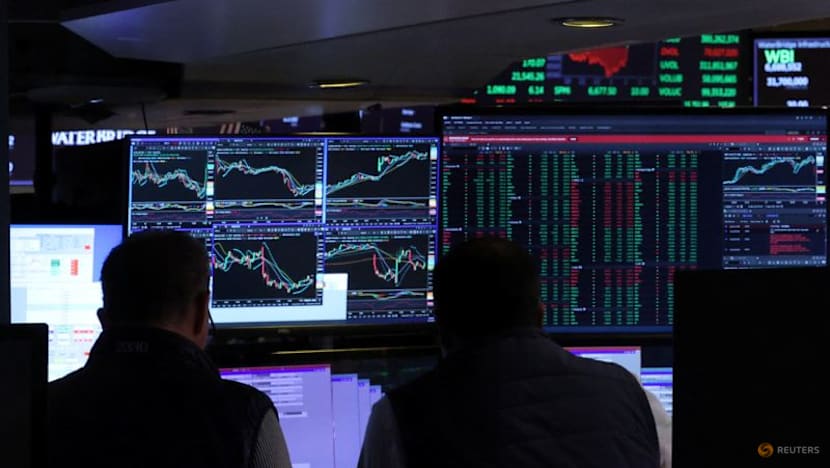Bull run in stocks continues; US dollar rises after US jobless claims data

FILE PHOTO: Traders work on the floor at the New York Stock Exchange (NYSE) in New York City, U.S., September 17, 2025. REUTERS/Brendan McDermid/File Photo
NEW YORK : World equity markets reached a new peak on Thursday, powered by a continuing bull run on Wall Street, while the U.S. dollar rose against major peers on news that fewer Americans filed new applications for unemployment benefits last week.
The pound dipped slightly after the Bank of England kept rates unchanged.
Benchmark S&P 500, the Dow and the Nasdaq all posted record closing highs. Intel jumped more than 22 per cent after Nvidia said it would invest $5 billion in the struggling U.S. chipmaker. Nvidia's shares closed up 3.5 per cent on the day.
The Dow Jones Industrial Average rose 0.27 per cent to 46,142.42, the S&P 500 climbed 0.48 per cent to 6,631.96 and the Nasdaq Composite advanced 0.94 per cent to 22,470.73.
The small-cap Russell 2000 index rose and touched an intraday record high for the first time since November.
The pan-European STOXX 600 index gained 0.8 per cent. MSCI's gauge of stocks across the globe rose as high as 981.65, topping the previous session's record. It was last up 0.29 per cent at 979.18.
The Fed cut rates by 25 basis points on Wednesday and its closely watched "dot plot" had pointed to two more rate cuts over its remaining two meetings this year, but only one additional reduction in 2026.
"The market is getting a little priced for perfection, and some of the job erosion is a little unsettling, which is what I think probably led (Fed Chair) Jerome Powell to make his cut yesterday and sort of say he's going to continue to be data dependent," Sandy Villere, portfolio manager at Villere & Co in New Orleans.
"The economy in general, between the eroding job numbers and inflation, has kind of stabilized - although you can never fight the Fed and falling rates, which is what I think got the market popping today with a little follow-through," Villere said.
The yield on benchmark U.S. 10-year notes rose 3.2 basis points to 4.108 per cent.
The Bank of England voted 7-2 to keep rates unchanged at 4 per cent while slowing the annual pace at which the central bank sells gilts it purchased between 2009 and 2011 to 70 billion pounds from the current 100 billion pounds, in line with economists' forecasts.
The dollar strengthened 0.52 per cent to 0.793 against the Swiss franc and was up 0.67 per cent at 147.95 against the Japanese yen.
While data showed fewer Americans filed new applications for unemployment benefits last week, the labor market has softened as both demand for and supply of workers have diminished.
The euro fell 0.23 per cent to $1.1785 while the sterling weakened 0.56 per cent to $1.355. The dollar index rose 0.43 per cent to 97.37.
Norway's central bank cut its policy interest rate by 25 basis points to 4.0 per cent, as widely expected, and said it aims to cut again in the next 12 months but not as much as previously planned. The Norwegian krone remained near a three-year high.
Germany's parliament approved the nation's first annual budget since sweeping reforms to loosen fiscal rules were passed earlier this year. In France, hundreds of thousands took part in anti-austerity protests, unions said, urging President Emmanuel Macron and his new Prime Minister Sebastien Lecornu to acknowledge their anger and scrap looming budget cuts.
The yield on German 10-year Bunds, the benchmark for the euro zone bloc, rose 1.2 basis points to 2.727 per cent.
Oil prices fell. Brent crude futures dropped 0.8 per cent to settle at $67.44 a barrel, while U.S. West Texas Intermediate (WTI) crude fell 0.8 per cent to settle at $63.57.
Gold prices took a breather from record highs. Spot gold fell 0.38 per cent to $3,645.89 an ounce.













